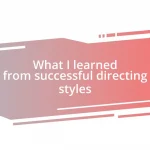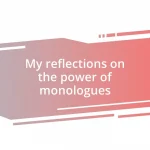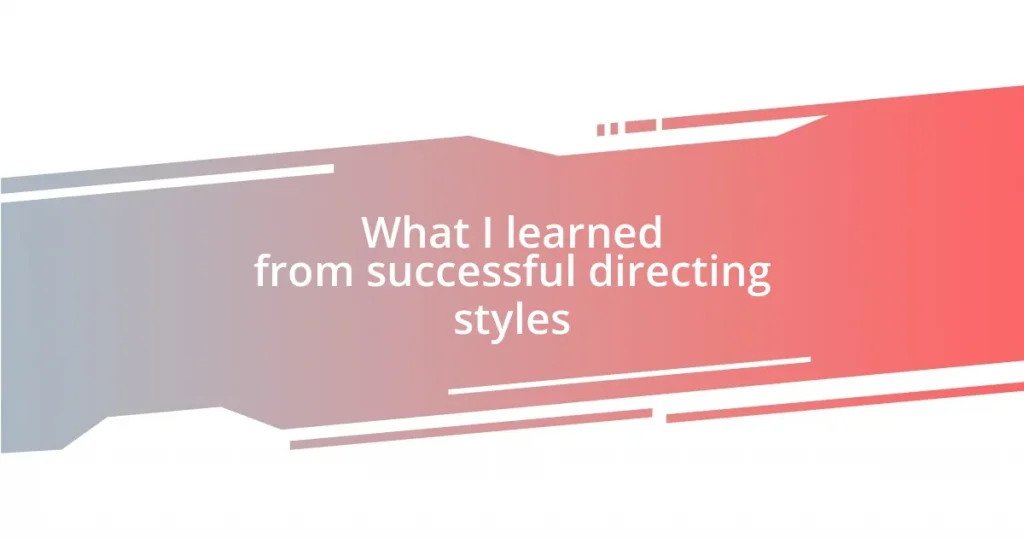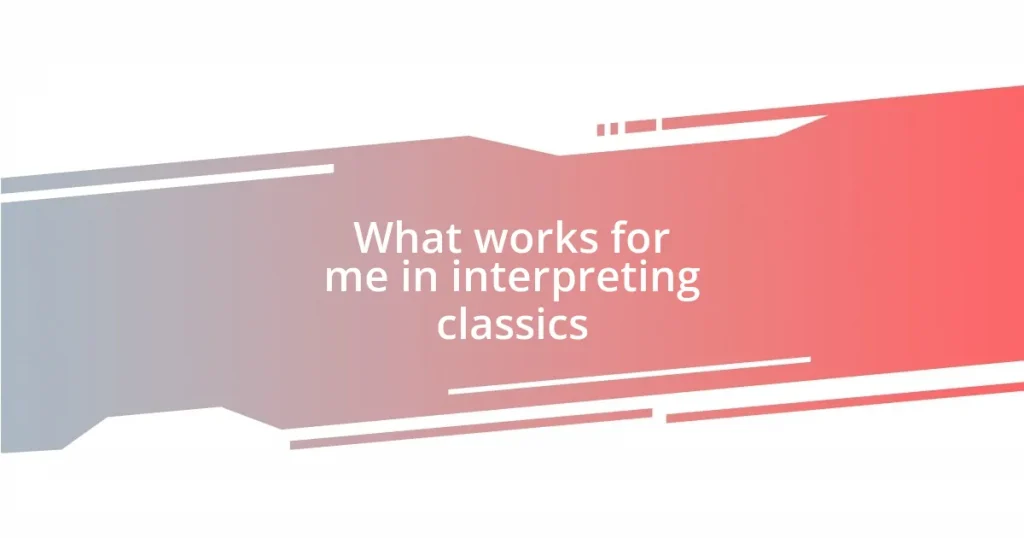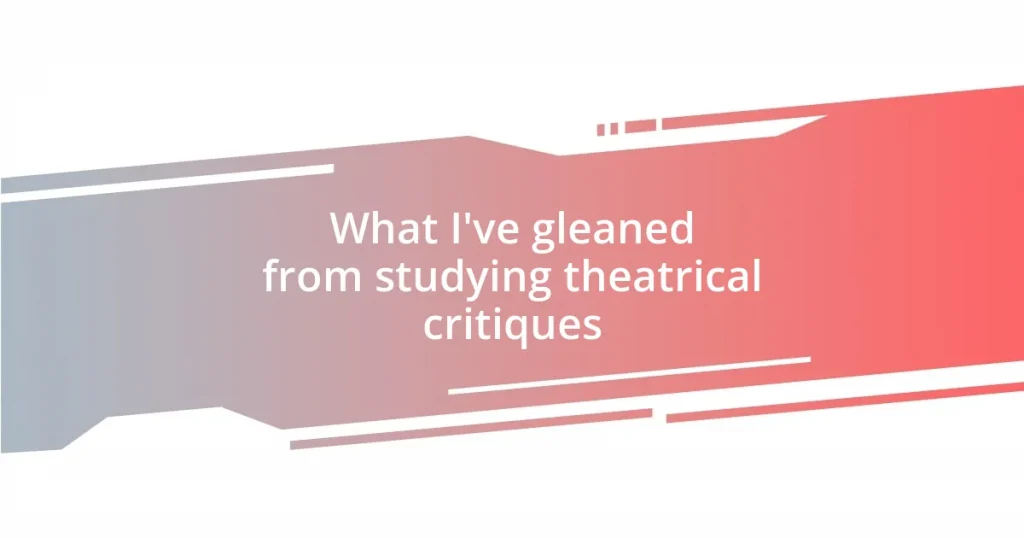Key takeaways:
- Understanding audition requirements and preparing a detailed checklist can reduce anxiety and improve performance.
- Choosing material that resonates personally and aligns with the character enhances emotional impact and performance authenticity.
- Creating a structured practice schedule helps maintain focus and builds confidence through consistent preparation.
- Mental preparation techniques like visualization, mindfulness, and positive affirmations can significantly enhance performance readiness.

Understanding audition requirements
Understanding audition requirements can feel overwhelming at first, but I’ve learned that breaking them down makes it much easier. For instance, when I was preparing for a musical theater audition, I made a checklist of everything they were looking for: specific songs, monologues, and even choreography. It turned out to be a game-changer—having a clear layout of what was expected removed much of the anxiety.
Often, I wonder how many aspiring performers skip the fine print. I remember a time when I neglected to review the specific character breakdown and ended up showcasing the wrong style. That experience taught me the value of understanding the nuances in the requirements; each detail can significantly impact how casting directors perceive my potential.
It’s also important to consider the overall vibe of the production. When I took the time to immerse myself in the show’s tone, it made my choices more authentic. How does one person do this? I often watch or listen to previous iterations of the show, noticing how others interpreted the material, and that insight shapes my own preparation. Understanding the audition requirements isn’t just about checking boxes; it’s about connecting with the material on a personal level.

Choosing the right material
Choosing the right material is one of the most crucial steps in preparing for auditions. From my own experience, I always prioritize selecting pieces that resonate with me personally. I recall choosing a contemporary ballad for a music audition; the moment I poured my heart into that song, I felt an instant connection. It wasn’t just about hitting the right notes; it was about sharing a story that I truly believed in, which, I think, made my performance stand out.
It’s also essential to analyze the character you’re portraying. I remember for a recent theater audition, I selected a monologue that really captured the emotional journey of my character. Not only did I want the casting directors to see my acting range, but I also aimed to evoke emotions that would resonate with them. I’ve learned through trial and error that when I choose material that reflects the character’s complexity, my portrayal becomes much more impactful.
A common dilemma I face is whether to go for something familiar or challenge myself with new material. In a past audition, I opted for a lesser-known piece, thinking it would showcase my originality. Although it was nerve-wracking, it allowed me to discover depths within the character that I hadn’t explored before. Striking a balance between comfort and challenge is key in my preparation process; it’s something I continue to refine each time I audition.
| Considerations | Examples |
|---|---|
| Personal Connection | Contemporary ballad that resonates with my experiences |
| Character Analysis | Monologue capturing complex emotions |
| Comfort vs. Challenge | Lesser-known piece that stretches my abilities |

Creating a practice schedule
Creating a practice schedule is critical for my audition preparation. I’ve learned that setting aside specific times to rehearse helps me stay committed and focused. When preparing for my last audition, I structured my week to include dedicated blocks for vocal warm-ups, monologue runs, and dance practice. This approach not only improved my skills but also made the entire process feel more manageable.
To ensure consistency and accountability, I write down specific goals for each rehearsal session. This organized method keeps me motivated and allows me to track my enhancements over time.
- Daily Vocal Exercises: 30 minutes of scales and song excerpts to build range and control.
- Monologue Practice: 1 hour, alternating between emotional delivery and technical refinement.
- Dance Rehearsal: 1 hour focusing on choreography, breaking down complex steps into manageable parts.
In my experience, having a structured schedule makes all the difference. I remember feeling particularly anxious before one audition, but knowing I had put in the time to practice allowed me to enter the room with confidence. By treating my schedule as a roadmap, I can navigate my preparations more effectively.

Techniques for effective rehearsals
To make rehearsals effective, I’ve found that a targeted approach works wonders. For instance, I often focus on one specific aspect of my performance each session, whether it’s emotional depth or vocal clarity. There was one rehearsal where I dedicated the entire time to fine-tuning my emotional delivery. It felt a bit uncomfortable at first, but I eventually found layers in my character that I hadn’t explored before. How often do we shy away from tackling the tougher parts of our performance? I believe that embracing discomfort can lead to extraordinary breakthroughs.
Another technique I swear by is recording my rehearsals. Watching myself back feels a little strange, but it’s an invaluable tool for improvement. I remember the moment I noticed a repetitive nervous gesture during a performance. It was eye-opening! By identifying these small nuances, I was able to adjust my physicality and bring authenticity to my characters. How do you know if you’re fully present in your performance without seeing it from an outside perspective? It’s a game-changer.
Lastly, I think it’s crucial to rehearse with someone else, whether it’s a friend or a coach. Sharing your space with another person not only offers fresh insights but also simulates the audition environment. I recall practicing a duet where my partner pushed me to harmonize in ways I hadn’t considered. Imagine the value of having another set of ears to catch things you might miss! This collaborative energy often breathes new life into my rehearsals, making them feel dynamic and vibrant. How can we grow without collaboration? Engaging with others has truly enriched my preparation process.

Preparing mentally for auditions
When it comes to mental preparation for auditions, I find visualization to be an incredibly powerful tool. I often set aside a few quiet moments to close my eyes and picture myself walking confidently into the audition room. In these visualizations, I imagine the sounds, the lights, and even the judges’ faces—this practice calms my nerves and enhances my focus. Have you ever noticed how a clear mental picture can turn anxiety into anticipation?
Another technique that helps me is practicing mindfulness. Before diving into rehearsals, I take a few minutes to breathe deeply and ground myself. I remember one audition where I felt overwhelming pressure, but during my mindful moments, I learned to tune into my body and release that tension. It’s amazing how just a few deep breaths can shift your mindset, right? This practice not only centers me but also makes me more in tune with my emotional state throughout the audition process.
Lastly, I firmly believe in positive affirmations. Each day leading up to an audition, I recite phrases like “I am prepared” and “I am deserving of this opportunity.” Sounds a bit cliché, doesn’t it? But trusting these words has transformed my self-doubt into inner strength. For instance, during a recent audition, I caught myself repeating my affirmations just minutes before stepping on stage, and it truly helped me to channel my nerves into a powerful performance. How often do we underestimate the impact of our self-talk? It can be the difference between self-sabotage and self-empowerment.

Dressing for success
Dressing appropriately can really influence my mood and confidence during an audition. I remember one time I wore an outfit that I felt completely uncomfortable in—it was a beautiful dress, but it didn’t represent my style. Instead of feeling like I could showcase my talent, I was preoccupied with adjusting the fabric and worrying about how I looked. Have you ever worn something that made you feel less than yourself? The difference a well-chosen outfit can make is profound.
When selecting my attire, I also consider the character I’m portraying. For instance, if I’m auditioning for a role that requires a modern, edgy vibe, I lean towards outfits that express that energy. On the other hand, classical roles might call for something more timeless. I vividly recall an audition where I wore a vintage-inspired dress that perfectly matched my character’s essence. As soon as I put it on, I felt an immediate transformation—I was no longer just myself, but the character! Isn’t it fascinating how clothing can help us embody the roles we’re meant to play?
Ultimately, I believe in wearing what makes me feel powerful and authentic. Some audition days, I opt for bold colors that energize me, while other times I prefer softer tones that evoke a sense of calm. Just last week, I donned a bright red blazer for an audition and felt like I walked in with extra confidence. How often do we overlook the psychology behind our clothing choices? Trusting my instincts about what to wear not only boosts my self-assurance but also allows me to focus on delivering my best performance.

Post-audition reflection and learning
After an audition, I always take a moment to reflect on my performance. I like to jot down my impressions, focusing on what felt strong and where I stumbled. Recently, after an intense singing audition, I realized I had been overly fixated on hitting every note perfectly, which ironically led to tension in my voice. Have you ever noticed how that pressure can sometimes work against us?
I also think it’s crucial to understand feedback, whether it’s direct or subtle. During one memorable audition, a judge gave me a nod of approval during a tricky moment. That small gesture encouraged me to trust my instincts more in future performances. So, I make it a practice to analyze not just my execution, but also how my presence resonated with the casting team. What have you learned from the reactions of others in your auditions?
Lastly, I find great value in seeking advice from trusted mentors or peers. Right after my auditions, I sometimes reach out to a fellow actor to share experiences. In one case, my friend pointed out that I overexerted during my emotional scenes. That feedback opened my eyes to how crucial it is to strike a balance between passion and restraint. Isn’t it fascinating how an outside perspective can illuminate our blind spots?
